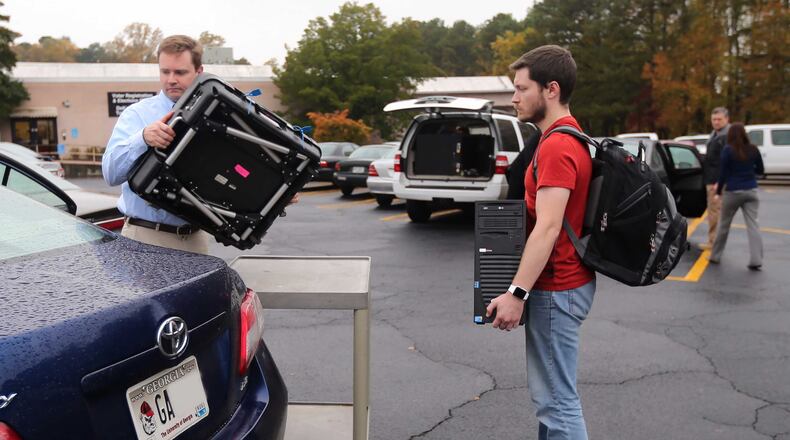A 14-month-old investigation into DeKalb County election irregularities is stalled because of a dispute between a judge and the state over how to proceed.
State agents seized a voting machine in November 2015, but there's been little progress in the inquiry into alleged problems with that election, which included the LaVista Hills cityhood vote. A former county elections employee said voters were turned away from polling places; voter material wasn't properly secured; and that he found a loose election memory card lying around.
The Georgia Secretary of State’s Office emailed and subpoenaed requests for official vote counts, voter certificates and ballot recap sheets last year, but a DeKalb Superior Court judge said they can’t be turned over without going through a court process. The judge also said the state needs to file public court documents to obtain the information, but some state officials believe that’s unnecessary.
State investigators should be able to resolve the case relatively quickly once they have the election materials, said Candice Broce, a spokeswoman for Secretary of State Brian Kemp.
“We don’t expect there to be any huge revelations” as a result of the investigation, Broce said. “We’re hoping our investigators can get the documents they need to close it out and get the case to the State Elections Board for resolution.”
Superior Court Judge Tangela Barrie said the courts have a responsibility to safeguard election records. She also said she never received the subpoena for the information, which was dated July 6, 2016.
“I’m just trying to protect the integrity of the procedure,” said Barrie, who was the court’s chief judge last year. “Usually, a judge won’t just make an order. There has to be a request to the court.”
The county elections official who complained about irregularities said the problems occurred during a referendum on creating the city of LaVista Hills. Already, DeKalb acknowledged it initially overlooked 41 provisional ballots countywide, including 19 in LaVista Hills, which increased the proposed city's margin of defeat by three votes.
But the investigation might not be related to the cityhood referendum, which fell short by 139 votes, said DeKalb Elections Director Maxine Daniels.
The voting machine confiscated by the state was from a precinct in Dunwoody — located north of LaVista Hills — where a memory card had jammed on election night, Daniels said. Election workers were able to remove the memory card and count it that night, on Nov. 3, 2015.
“There was never anything to do with LaVista Hills,” Daniels said.
The elections supervisor who brought up concerns about voting integrity, Leonard Piazza, has said that, in an attempt to prove the tampering, he took a memory card from a LaVista Hills precinct and copied information from DeKalb’s voting tabulation server. Piazza turned the memory card over to the Secretary of State’s Office.
Removing a memory card and copying election data isn’t allowed under state law and election procedures. Piazza resigned last summer, Daniels said.
Residents in the LaVista Hills area, located near Emory University, want closure after a tight election and allegations of wrongdoing, said Mary Kay Woodworth, who led a group supporting the cityhood effort.
“I don’t really share those suspicions” of election tampering, she said. “I don’t believe there could have been this grand conspiracy on an individual level at polling places. With the small margin we lost the vote by, it’s easy to have false hope.”
Rep. Scott Holcomb, whose district includes part of the LaVista Hills area, said he’s heard little information about the progress of the investigation.
“I know my constituents are interested in getting this wrapped up because the election was held back in 2015, and now we’re in 2017,” said Holcomb, D-Atlanta. “It should be pretty simple.”
He said he’d consider whether legislation is needed to clarify state law governing how investigators should go about obtaining election information.
About the Author
Keep Reading
The Latest
Featured





